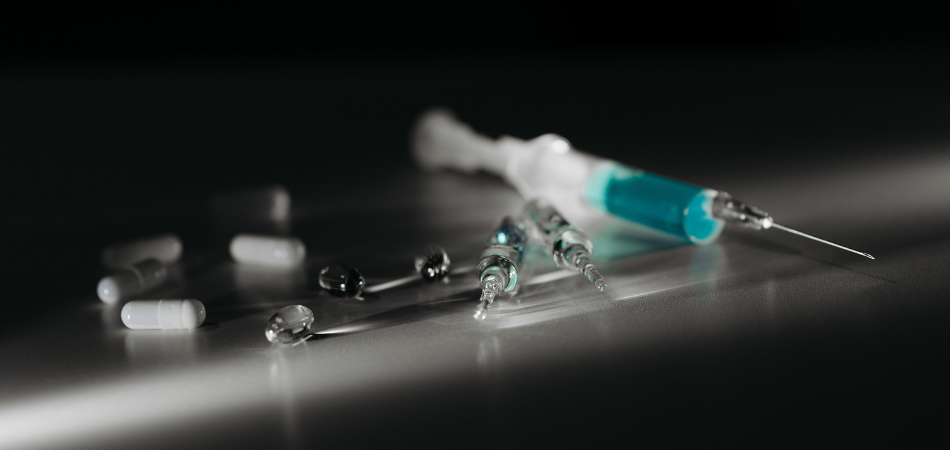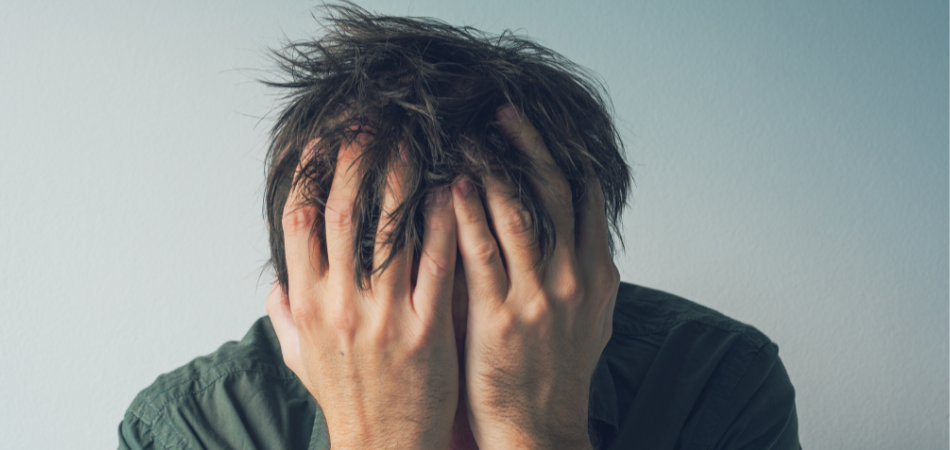- Select
- Drug Addiction
- Drug Detox
- Drug Rehab

Written by:

Medically Reviewed by:
Last Updated:
February 14th, 2025
Drug addiction is a significant problem, one which can lead to dangerous consequences if you do not have access to proper treatment. For those struggling with drug addiction, a dependence can have the potential to fracture relationships, disrupt career progression and impact financial stability. With an estimated 1 in 11 adults, or approximately 3.2 million people admitting to having taken a drug in the last year, it is crucial that drug-seeking behaviours are taken seriously and that we are aware of how to spot the signs in ourselves and others.
What is drug addiction?
Drug addiction is a condition in which individuals are unable to control their drug use, even if it is causing noticeable harm to their health and well-being.
There are a wide number of drugs that we can become addicted to. Some of the addictions we treat at Liberty House include:
Prescription drug
As substances prescribed by a doctor, prescription drug addiction can be difficult to spot, leaving many people unaware of the unseen risks that come with continued abuse of the substance.
Cocaine addiction
Cocaine is a powerful stimulant with highly addictive potential. A danger not just to your physical health, but your mental wellbeing as well, knowing how to spot the signs of cocaine addiction is crucial.
Crack addiction
Crack cocaine is a powerful stimulant with serious dangers. Aside from physical risks, crack addiction has the potential to impact everything from finances, careers and even relationships when left untreated.
GBL addiction
Gammabutyrolactone is a drug with pronounced sedative and anaesthetic effects. Used to reduce inhibitions and bring about intense feelings of euphoria, GBL addiction can be highly dangerous when left untreated.
GHB addiction
Gammahydroxybutrate is an illegally manufactured substance, commonly used to induce drowsiness and a reduced heart rate. When abused in high doses, GHB addiction is a very real possibility.
Heroin addiction
Heroin is a very dangerous Class A drug. After continued heroin use, it is easy for individuals to become addicted to the substance, needing professional support to break this harmful relationship.
Meth addiction
Methamphetamine is a highly powerful drug which can be hazardous when abused. For users who are taking meth regularly, it is vital they are aware of the signs of addiction.
Ecstasy addiction
Ecstasy is a common party drug, frequently taken by young adults in social settings like nightclubs. Often overlooked as harmless, ecstasy addiction is real problem which can come with serious consequences if not addressed.
Spice addiction
Spice is a synthetic cannabinoid, frequently sold over the internet or on the dark web. Affecting the same areas of the brain as THC, spice has a very high potential for addiction.
Hallucinogen addiction
Hallucinogens are powerful psychoactive drugs that have shown a strong tendency to induce dependence and addiction, with severe consequences for both physical and mental health.
What do drugs do to the brain?
Part of the reason people become addicted to drugs is because of the way these substances affect the brain’s natural processes. Neurotransmitters such as dopamine and norepinephrine (the brain’s ‘feel-good’ neurotransmitters) are heavily influenced when an individual takes drugs. These chemical messengers release pleasurable sensations when someone takes part in certain behaviours, rewarding them for activities like socialising with friends or eating a healthy meal. However, drugs can manipulate these neurotransmitters, raising levels of pleasure to unhealthy and dangerous levels.
The first time someone abuses a drug, it works through their bloodstream, and the chemicals in the substance travel to the brain and disrupt normal functioning. Their brain will then release an unnaturally high number of reward signals, leaving the user experiencing pleasurable emotions like they have not experienced before. As a result, when users do not have access to the substance, their bodies will struggle to cater to this change, leaving them feeling flat, depressed or very low in energy. These emotions will then prompt individuals to take drugs again just to capture that initial rush of satisfaction.
However, with continued use, the initial potency of the drug will wear off, meaning the user will need to take higher doses of the substance just to feel the same ‘high.’ When this happens, it is known as tolerance. As a result, repeatedly taking drugs can lead a user to take them just to feel normal, creating a vicious cycle of drug abuse which can be very difficult to break. Therefore, those struggling with drug addiction often need to engage with professional support to address their reliance through access to options such as a drug detox, alongside a comprehensive drug rehab treatment programme.
Signs and symptoms of drug addiction
Drug addiction can have a way of convincing someone that they have their habit under control. As the brain will have undergone changes from abusing drugs, their perception can be altered, often to the point that they cannot recognise or see the problem in themselves – even if it appears so obvious to others. However, taking illegal drugs doesn’t necessarily mean that someone has a drug problem. For example, someone could abuse cannabis but that doesn’t mean they have a cannabis addiction. Therefore, its essential to familiarise yourself with the main signs and symptoms of drug addiction.
If you are unsure whether you have a drug problem which needs addressing, consult with these questions below:
- Do you feel that you spend a lot of time either using, buying, or coming down from drugs?
- Is it difficult for you to go more than a few days without access to a drug?
- Do you experience strong cravings for a drug when you do not have it?
- Have your friends and family started to notice changes in your behaviour, beginning to worry for your health or well-being?
- Are you starting to distance yourself from those around you, only associating with other individuals who also take drugs?
- Do you feel that you need to take drugs just to cope with everyday life and its challenges?
If you have answered ‘yes’ to any of the questions above, this may mean that you are struggling with drug addiction.
Which type of people get addicted to drugs?
Anyone has the potential to develop a drug addiction, regardless of the nature of the drug; it could be a less commonly known diagnosis such as a ketamine addiction or an LSD addiction. There is no way of telling exactly who is likely to fall victim to drug addiction next. However, certain factors can increase a person’s likelihood of developing a substance addiction. Some of these include:
- Genetics – Circumstances which are out of our control, like hereditary influences and a family history of drug addiction have been known to increase a person’s likelihood of developing a drug addiction.
- Environmental factors – Living in areas with high crime rates and easy access to drugs can increase an individual’s chances of falling into substance abuse.
- Co-occurring disorders – For those struggling with mental health problems such as borderline personality disorder (BPD), schizophrenia and depression, drugs can be used to self-soothe or cope with the realities of their condition, eventually resulting in an unhealthy reliance.
- Lived experience – For those who have encountered traumatic or distressing events in their past, drug addiction can often ensue in efforts to keep their pain at bay.
In light of the above information, it is important we remember that, while these factors can make someone more prone to developing a drug addiction, addiction is a condition that affects people from all walks of life.
Is drug addiction a choice?
There is a great deal of debate surrounding drug addiction and whether individuals have a choice over their drug use. Here, we outline the difference between misuse and drug addiction, exploring how much choice users have over their consumption.
The choice
The first time someone takes drugs, they make a decision to do so. This choice could be down to a number of factors, such as peer pressure, wanting a pick-me-up at a party, or simple curiosity. Whatever the reason, somebody who chooses to take drugs for the first time does not have a goal of becoming an addict. In fact, they may not even be aware that drug use carries a potential for drug addiction. For example, an individual who is prescribed medication by a doctor could be completely oblivious to the hidden risks that come with taking such a substance.
The compulsion
If a person continues to use a drug, their brain will have changed in relation to the substance, with their ability to make decisions impaired and overcome by their dependence. Over time, the individual will become entirely reliant on the drug, with this reliance eventually resulting in addiction. At this point, the user will have no control over their urges and no matter how much they may want to quit, they can find it impossible to do so.
The stigma
It can be hard for others to understand why a person would want to continue taking drugs when it results in such obvious negative consequences. It might seem difficult to comprehend that drug addiction is an illness which requires far more than just strong will or good intentions to overcome. However, it is important to remain mindful that drug addiction is not a choice, and it is often this mindset that can prevent users from recognising that they have a drug problem which will require support to overcome. Fortunately, recovery is a choice, and as soon as a person decides to heal, they’re free to embark on a healthier and more fulfilling life.
Can Liberty House help with drug addiction?
At Liberty House, we understand just how frightening it can be to confront your drug addiction without the right support and guidance to overcome it. For this reason, we would urge you to reach out to our compassionate staff team today for all the advice that you need in starting your recovery journey. By offering you a peaceful environment free from external triggers, you will have space to focus solely on your addiction, allowing you the best resources to begin a healthier life. For more information about Liberty House and what we can do to help, do not hesitate to contact a member of our team right away.
















